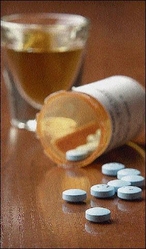Performance-enhancing drugs
Published: Wednesday | August 19, 2009

As a pharmacist, I've learnt to respect drugs, and I'm finicky about which ones I allow into my system. There has been a lot of talk recently about banned substances in sport. The banned substances (drugs) have the potential to either give athletes unfair advantage by artificially enhancing their performance or endanger their health.
Doping is the use of chemical substances with the intention or effect of altering performance. Many of these drugs and methods can kill. Side effects vary from (increased) masculinity, including permanent deepening of the voice, enlargement or shrinking of organs, fatal liver damage or fatal blood clotting (thrombosis).
Declaration in writing
Prescribed medications are allowed for certain medical disorders like asthma, epilepsy or bacterial infections. When taking any drug for specific medical conditions, the athlete is required to declare this in writing to the relevant sporting authorities before competition and to conform to strict medical supervision. All medical details must be provided.
Over-the-counter drugs and food
Athletes must exercise care when deciding what they consume since a positive test may prejudice their careers. Alcohol and everyday drugs found in coffee, tea, cigarettes and ganja as well as some ingredients in over-the-counter preparations for allergies, cough, cold and diarrhoea are on the list of banned substances. There are no acceptable excuses for positive tests. Ingredients in nutritional supplements and herbal extracts should be examined carefully before consumption.
Banned methods
Apart from banned substances, there are banned methods. These are practices which directly enhance performance or change the results of tests.
Blood doping for more oxygen - One blood doping practice involves removing some of the athlete's blood and forcing the body to produce more. The removed blood is stored then replaced shortly before competition. This old blood gives the athlete additional haemoglobin and he or she can now store more oxygen in muscles and deliver a better performance. Similarly, injecting a hormone such as erythro-poetin (EPO) stimulates production of more blood, increasing the muscles' ability to carry oxygen.
I want muscles - An athlete may inject insulin regularly which, along with high carbohydrate diet and exercise, increases muscle size and strength to maximise performance.
Playing with urine - Providing 'substitute urine', or manipulating 'genuine urine' samples to mask banned substances before testing are other banned methods. Taking a masking agent like probenecid or a diuretic (water tablet) may block the banned performance-enhancing drug from leaving the body through urine or may simply mask the banned drug in urine.
Weight manipulation - Diuretics can alter the athlete's weight which is desirable in some sports where the athlete is classified by weight.
Some banned substances
Anabolic agents - These include drugs called beta-agonists as well as steroids like testosterone (male hormone) and related compounds like stanozolol. Human growth hormone (HCG) and another hormone human chorionic gonadotrophin (HCG), the hormone we look for in pregnancy tests, are taken by some athletes to improve muscle strength.
Stimulants - These include amphetamines (decreases fatigue and may increase self-confidence), caffeine (reduces fatigue and increases efficiency), cocaine (increases mental sharpness and concentration), and drugs like methyl-xanthines, ephedrine, pseudo-ephedrine, phenyl-ephrine in cough and cold products. These help clear the passages in the lungs to make it easier to breathe, increasing the availability of oxygen and increasing performance.
Beta-Blockers - These are blood-pressure drugs like atenolol and propranolol which do not help stamina. However, they produce mental calmness and a steady hand (they control tremor) so are taken by those who participate in target sports requiring control, like shooting or driving.
Dahlia McDaniel is a pharmacist and final-year doctoral candidate in public health at the University of London; email: yourhealth@gleanerjm.com.


